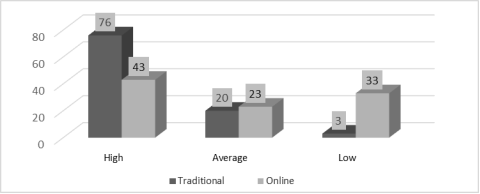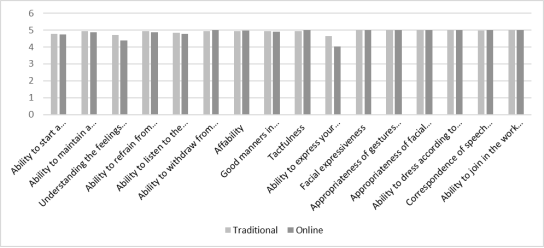The article analyzes the peculiarities of the communicative sphere of adolescents studying at different forms of educational process organization.
Keywords: teenagers, communicative sphere, form of education.
Communication plays a key role in the lives of adolescents as they strive for self-actualization and socialization. Nowadays there are many different forms of education that influence the communicative sphere of adolescents. The peculiarities of this sphere in different forms of learning are an important aspect of study, as they can affect the success of learning, adaptation in society and the development of adolescents` personality. D. B. Elkonin defines communication as the leading activity for adolescence [1]. Studying the peculiarities of the communicative sphere of adolescents under these forms of training allows us to better understand how these forms affect the development of communication skills, as well as whether they contribute to more effective communication and the formation of social ties in adolescents.
The following scientists have studied the problem of communication: G. M. Andreeva, A. A. Bodalev, V. N. Druzhinin, V. V. Znakov, A. A. Leontiev, B. F. Lomov.
The purpose of the article is to identify the peculiarities of communicative sphere of adolescents in different forms of education.
The study involved 60 adolescents aged 14–16 years old. The methodology «Communicative and organizational aptitudes» (V. V. Sinyavsky, V. A. Fedoroshin) and the scale «Technique of communication» (N. D. Tvorogova) were used as research techniques. Let us present the results of the distribution of adolescents with different forms of education by levels of sociability formation (Fig. 1).

Fig. 1. Distribution of adolescents by levels of sociability (%)
Figure 1 shows that the majority of adolescents studying traditionally, namely 76 %, and only 43 % of adolescents studying online, have a high level of communication as communication. Such teenagers are active in communicative communication, they initiate and organize the actions of two or three peers, verbally deploying initial intentions, goals, planning a few initial actions, using simple agreement. 3 % of adolescents who study traditionally and 33 % of adolescents who study online have a low level of formation of communication as communication, which characterizes them as inattentive, situational in their choices, low-active in communicative communication, low-talking both with teachers and peers.
The study of communication skills among adolescents studying under different forms of education showed us the results summarized in the diagram below (Fig. 2).

Fig. 2. Expression of communicative skills among adolescents studying under different forms of education (cf. b.)
Based on the obtained data, it can be seen that adolescents who study traditionally (4.72) better understand the feelings and intentions of another person than adolescents who study online (4.38). The ability to express their thoughts accurately and clearly is highly developed in adolescents who study traditionally (4.66) and poorly developed in adolescents who study online (4.03).
The nonparametric Mann-Whitney test was used to identify the features of the communicative sphere of adolescents studying under different forms of education (Table 1).
Table 1
Expression of communicative skills in adolescents under different forms of education, cf. b.
|
Communication skills |
Form of training |
Uemp | |
|
Traditional |
Online | ||
|
Understanding the feelings and intentions of the other person |
4.72 |
4.38 |
- 2.565* |
|
Ability to express your thoughts accurately and clearly |
4.66 |
4.03 |
- 4.628* |
Note: *р≤0,01
The analysis revealed that there are differences at a high level of significance p≤0.01 on the scales «understanding of feelings and intentions of another person» and «ability to express their thoughts accurately and clearly».
In our study it was revealed that online junior high school students have a lower level of communicative skills formation than traditionally taught junior high school students. From this we conclude that the form of learning affects the peculiarities of communicative sphere of junior schoolchildren. Also, in the study it was revealed that junior schoolchildren who study online have a lower level of ability to understand the feelings and intentions of another person. Thus, the obtained results of this article can contribute to further research on the solution of this problem.
References:
- Zh. A. Lesnyanskaya, Psychology of adolescence and early youth: textbook for the course «Psychology of adolescence»/ Zh. A. Lesnyanskaya; Zabaikal State University. — Chita: ZabGU, 2018. — 148 с.
- N. D. Tvorogova, Psychology: Textbook / N. D. Tvorogova. — 4th ed., revision and add. — Moscow: LLC «Publishing House «Medical Information Agency», 2020. — 664 с.

